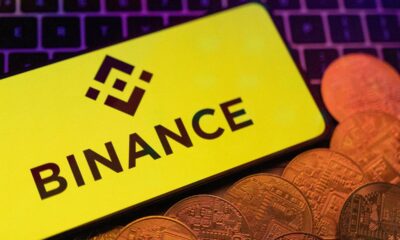News
Franklin Templeton CEO praises public blockchains

Jenny Johnson, chief executive of Franklin Templeton, said it was important that the company’s tokenized money market fund runs on a public rather than private blockchain, even though the fund’s assets have been overtaken by rival Blackrock fund.
She spoke at the Consensus 2024 conference in Austin, Texas on May 30 and explained how the asset manager got involved in digital assets. Johnson’s grandfather founded Franklin Templeton 77 years ago and the family still owns just over 40% of the asset manager.
Jenny Johnson, Franklin Templeton
“I think it’s important because, unlike many public companies, we really think generationally,” he said. “When I looked at blockchain, I said this was going to be a radical change and we better make sure we understand it.”
Initially, increased efficiency was the main attraction of using blockchain. Johnson cited the example of Franklin Templeton who had to employ hundreds of people to carry out reconciliations between its internal systems, before having to reconcile with external counterparts. Therefore, blockchain solves two problems by providing a general ledger and a source of truth.
“Once the source of truth is resolved, the times at which the truth is updated changes and this can lead to an atomic solution,” Johnson added. “If you manage to have money transactions transacted at the same time and you validate both parties, you will incur huge costs.”
He argued that the collapse of FTX would not have happened if the cryptocurrency exchange had been built on a public chain. Over time, Johnson expects regulators to recognize that they have more information about public chains, because they can see transactions and use artificial intelligence to evaluate any that seem strange.
Tokenized funds
Franklin Templeton launched a tokenized money market fund in 2021, after working with the SEC for approval. In April this year Franklin Templeton said it would introduce new features to the first US-registered mutual fund to process transactions and record stock ownership on a public blockchain, as shareholders can complete peer-to-peer transfers.
The Franklin OnChain US Government Money Fund invests at least 99.5% of its total assets in government bonds, cash and repurchase agreements fully backed by government bonds or cash and had more than $360 million in assets as of March 31, 2024 under management. the fund is represented by a BENJI token, and the fund’s transfer agent maintains the register of share ownership using blockchain technology to record transaction activity.
In March this year, BlackRock launched its USD Institutional Digital Liquidity Fund (BUIDL) on the public Ethereum blockchain, which offers qualified investors the opportunity to earn US dollar returns by subscribing via Securitize Markets.
Just over 1 month later @Black Rock BUIDL and is already the largest tokenized onchain treasury product at $375 million
Vision for @reserveprotocol is that anyone can pool tokenized assets such as stocks, bonds, commodities and money markets to create diversified assets,… pic.twitter.com/f5UVCCG0qN
— Thomas Mattimore (tmattimore.eth) (@mattimost) May 1, 2024
Johnson said: “Ours is the one that runs on a public blockchain, the other one overshadows the public blockchain. We shadowed for the first six months, then the SEC felt comfortable enough to let us just run it on the public blockchain.”
Managing the fund on the Stellar blockchain allows you to pay the intraday yield via BENJI. The yield is 5.1%, and Johnson said that if holders sell a token mid-day, they earn yield for a certain number of hours and the buyer receives the rest.
“This isn’t available unless you’re on the public chain, because it’s so precise,” he added. “We see this as a way to provide traditional assets and be able to create exposures to traditional ETFs in the market that can be held in a digital wallet.”
Because Franklin Templeton wanted to operate the fund on a public chain, he had to build an on-chain shareholder recordkeeping system and a hot and cold storage portfolio. Johnson said: “Our view is that this is going to be how a lot of people get their investment exposure in the future.”
With a tokenized fund at his disposal, Franklin Templeton began purchasing blockchain loans on-chain and became a node validator. Nodes can create, send, and receive blockchain data that validates, records and transmits every transaction on the network. Franklin Templeton now operates 30 nodes across 12 different chains.
“If you don’t participate in this system and you don’t see visibility into transactions, you’re going to have a hard time providing investment advice,” Johnson said. “You are at such a disadvantage by not being a node validator.”
Franklin Templeton’s experience as a good validator has also led to it producing research on 30 tokens, which Johnson says is as rigorous as all other research produced by the company.
The asset manager is also using capabilities and infrastructure it has built in other regions. For example, in the United Arab Emirates Franklin Templeton partnered with Dubai-based Medad Holding to launch a yield coin, which Johnson described as a hybrid between a stablecoin and a money market fund.
“You can’t do that today in the United States, but they have the regulatory infrastructure of the United Arab Emirates,” Johnson said.
Crypto ETFs
Franklin Templeton was one of 11 asset managers who launched a bitcoin exchange fund after the U.S. Securities and Exchange Commission approved ETFs.
Johnson said his father, who is 91, said he thought it would be a mistake to launch a bitcoin ETF. One of his arguments was that $8 trillion in bitcoin was traded in 2022, more than $6 trillion on Visa and $2.5 trillion on MasterCard.
“I think bitcoin is becoming more understood and generating more demand,” Johnson added. “It has been the fastest growing ETF for us.”
Bitcoin ETFs see record inflows as BlackRock’s IBIT leads the pack, outpacing peers with a staggering $24.5 million inflows. Ethereum ETFs await their turn in the spotlight as SEC approval approaches. The cryptocurrency market heats up, but who will emerge as the ultimate titan of ETFs?… pic.twitter.com/GPypTySBBJ
— Ouinex (@ouinex) May 31, 2024
The firm has also applied to the SEC to launch an ethereum ETF and is awaiting approval to begin trading. Franklin Templeton also has a venture capital fund that invests in digital assets, and Johnson said the firm will launch a second fund.
“The most important message is that we participate in this ecosystem and see ourselves as able to help bridge the old and new tracks,” he added.
SUBSCRIBE TO THE NEWSLETTER
And get exclusive articles on the securities markets
News
Blockchain Technology Will Transform Water Access and Management Globally

Disclosure: The views and opinions expressed here are solely those of the author and do not represent the views and opinions of the crypto.news editorial team.
Access to clean water is a basic human need, yet billions of people around the world still struggle to get it. According to the World Health Organization, over 2 billion people live in countries suffering from severe water stress, and this number is expected to continue to grow due to climate change and population growth.
Traditional water management systems have struggled to address these challenges, often hampered by inefficiencies, lack of transparency, and misallocation of resources. Blockchain technology offers a promising solution to these challenges, providing equitable access and sustainable use of this crucial resource.
The current state of water management
Water management today faces several pressing issues. Inefficiencies in water supply, distribution, and use, coupled with a lack of real-time monitoring, often result in resource waste and misallocation. Many water sources fail to realize their full potential due to infrastructure and financing shortfalls. For example, the Environmental Protection Agency (EPA) report indicated that the United States would need to invest $625 billion over the next 20 years to repair, maintain and improve the country’s drinking water infrastructure due to aging pipes and other infrastructure problems. Additionally, in the United States alone, household leaks can to waste nearly 900 billion gallons of water per year nationwide. This is equivalent to the annual domestic water consumption of nearly 11 million homes.
Furthermore, corruption and mismanagement of water resources can cause unequal distribution, with disadvantaged communities often bearing the brunt of water scarcity. For example, South Africa is struggling with myriad challenges to its water security: drought, inadequate water conservation measures, outdated infrastructure, and unequal access to water resources. The country faces significant water scarcity, with demand expected to outstrip supply by 2030, creating a projected gap of 17%.
Furthermore, the global water industry is highly monopolized, with a few key players controlling a significant share of the market. These companies exert substantial influence over the water supply chain, often prioritizing profit over equitable distribution and environmental responsibility. This concentration of power can lead to inflated prices and limited access for vulnerable populations. The global bottled water market alone is projected to reach $509.18 billion by 2030, with these large companies capturing a significant share of revenue. This monopolization exacerbates existing inequalities in water access and highlights the need for more decentralized and community-driven water management solutions.
Source: Grand View Search
The potential of blockchain in water management
Blockchain technology can address these issues by providing a transparent, secure, and decentralized platform for water resource management. This approach offers several advantages:
- Transparency and accountability. Blockchain’s immutable ledger ensures that all transactions and data entries are transparent and cannot be changed once recorded. This transparency can reduce corruption and ensure that water resources are allocated fairly and efficiently. For example, blockchain can be used to track water usage from source to end user, providing a clear record of how water is distributed and used. This level of transparency can help hold authorities accountable and manage water resources sustainably.
- Efficient resource management. Blockchain can facilitate the creation of smart contracts, which are self-executing contracts with the terms of the agreement written directly into the code. These contracts can automate water distribution based on real-time data, directing water to where it is needed most. For example, smart contracts could be used to manage urban water supply systems, automatically adjusting water distribution based on real-time consumption patterns and demand. This can help optimize water use, reduce waste, and ensure that households and businesses receive the right amount of water at the right time.
In Dubai, the Dubai Electricity and Water Authority (DEWA) has implemented a blockchain-based smart water network initiative as part of its broader smart city strategy. This project integrates blockchain technology with IoT sensors to monitor water usage in real time, manage distribution, and detect leaks. The decentralized ledger ensures data integrity and transparency, enabling more efficient water management and reduced waste. DEWA’s initiative aims to improve sustainability and resource management in the rapidly growing city, highlighting the potential of blockchain to support urban water management and conservation efforts.
Community participation and ownership
Through blockchain, individuals can directly control and monetize their access to water resources, eliminating the need for third-party intermediaries. This direct control model allows local communities to make collective and transparent decisions about their water use. By managing their water directly from the source, communities can tailor water management practices to their specific needs, promoting equitable distribution and encouraging a sense of accountability and stewardship.
Additionally, future models could allow people to monetize their access to water through web3 technologies. For example, a community-to-business (C2B) model could allow people to sell water directly to companies. In this model, people do not have to own the water directly, but can profit by staking their tokens during event sales pools. This approach not only supports sustainable water management, but also creates economic opportunities for community members. Additionally, a “Burn to Secure” protocol can be used to provide water allocation rights. This protocol provides a true sense of water security and financial opportunity by allowing people to redeem their rights. This system not only secures future water allocations, but also increases token scarcity and value.
Additionally, a pure sense of investment is achieved through investments in water sources. This leads to potential financial returns and dividends by addressing the inefficiencies in water supply mentioned above. By investing to finance infrastructure projects, such as building factories and improving distribution systems, more water can be brought to communities, creating additional economic opportunities.
Monetizing water access through the C2B model, the “Burn to Secure” protocol, and investments in water sources all generate economic benefits for the community, promoting a more equitable and efficient water management system.
Overcoming challenges
While blockchain technology has the potential to improve water management, there are challenges to its adoption. The complexity of blockchain systems and the need for technological infrastructure can be barriers, especially in developing regions. Additionally, there are concerns about the significant energy consumption of blockchain networks. However, technological advances and the development of more energy-efficient blockchain solutions are helping to alleviate these concerns. Additionally, education and capacity building are key to ensuring stakeholders understand how to effectively use blockchain technology. Governments, NGOs, and private sector partners need to work together to provide training and support to communities and water management authorities.
Blockchain technology offers a practical and effective means to improve water management. In addition to addressing inefficiencies, blockchain empowers communities, promotes sustainable practices, and opens up new economic opportunities through models like community-to-business (C2B). As we face the growing challenges of climate change and population growth, blockchain is not only an innovative solution, but represents a fundamental shift in the way we manage and value water resources. Adopting blockchain in water management is essential to creating a sustainable and equitable future by changing the way we interact with and protect our most vital resource.

Jean-Hugues Gavarini
Jean-Hugues Gavarini is the CEO and co-founder of LAKE (LAK3), a real-world asset company leveraging blockchain technology to decentralize access to the global water economy. LAKE aims to ensure access to clean water for all, protect water resources, and deliver water to those in need through innovative technologies. Jean-Hugues has a diverse career spanning the luxury, fashion, and footwear industries. His career path includes notable successes at Mellow Yellow, Cremieux, and Tod’s. Raised between Silicon Valley and the French Alps, Jean-Hugues has always been immersed in technology and freshwater resources. In 2018, Jean became the CEO of Lanikea Waters, a water solutions entity based in the French Alps. In 2019, the concept of LAKE was born, embodying his commitment to innovation and sustainability.
News
Blockchain and AI Expo 2024

With rapid advances in the world of AI and blockchain, there are opportunities to leverage the security and transparency features of blockchain to improve the reliability and trust of AI systems and data transactions.
Explore the synergy of these advanced technologies in virtual mode Blockchain and AI Expowhich takes place on October 31, 2024 TO 10:00 GMT.
The event features cutting-edge presentations led by leading experts in evolving fields. Presentations are set to explore opportunities and challenges in the fusion of blockchain and AI, real-world applications, ethics, innovations in environmental sustainability, and more!
Gain a comprehensive understanding of how these technologies can synergistically drive innovation, optimize operations, and promote strategic growth opportunities. Develop your knowledge to facilitate informed decision making and give your company a competitive edge in the growing technology landscape.
News
Nigeria Eyes National Blockchain Nigerium for Data Sovereignty

Nigeria is keeping an eye on a new native blockchain network to protect the country’s data sovereignty.
According to local media, a team from the University of Hertfordshire has proposed the new blockchain, Nigeriato the National Information Technology Development Agency (NITDA).
Chanu Kuppuswamy, who leads the team, argued that relying on blockchain networks whose developers are located in other regions poses national security risks to the Nigerian government. He further said that Nigerium would allow the West African nation to customize the network to meet specific needs, while also promoting data sovereignty.
In his presentation, Chanu cited the recent migration of Ethereum to test of participation (PoS) consensus as an instance in which no Nigerians were involved but whose impact is far-reaching.
“Developing an indigenous blockchain like Nigerium is a significant step towards achieving data sovereignty and promoting trust in digital transactions in Nigeria,” he said.
While receiving the proposals in Abuja, NITDA’s Kashifu Abdullahi acknowledged the benefits a local blockchain would bring to Nigeria, including increased security of citizens’ data.
However, a NITDA spokesperson later clarified that Nigerium is still at the proposal stage and that the government has not yet decided whether to proceed or not.
“The committee is still discussing the possibility with stakeholders. Even if a decision is finally made, there is no guarantee that the name will be Nigerium,” the spokesperson told the media.
Nigerium’s reception in the country has been mixed. Some, like financial analyst Olumide Adesina, To say the network is “dead on arrival”. He believes the Nigerian government’s poor record in following through on its big technology plans will claim another victim. He pointed to the eNaira as a missed opportunity whose chances of success were much higher than those of Nigerium.
Others welcomed the proposal. Chimezie Chuta, who chairs the renewed The Nigerian Blockchain Policy Committee is “extremely optimistic“that Nigerium will be more successful than eNaira.
Speaking to a local news agency, Chuta stressed that eNaira failed because the central bank initiated the project on its own, without involving any stakeholders.
“They just cooked it and expected everyone to like it. [With Nigerium]there will be a lot of collaboration,” he said.
Registration of property title, digital identity and Certificate Verification are among the use cases that Nigerium is expected to initially target. However, Nigeria has already made progress in some of these fields through public blockchains.
SPPG, a leading school in governance and politics, announced in May the country’s first blockchain certificate verification system. Built on the The BSV BlockchainIt was developed in collaboration with the blockchain data recording company VX Technologies and local lender Sterling Bank.
Watch: The Future Has Already Arrived in Nigeria
 Italian: https://www.youtube.com/watch?v=M40GXUUauLU width=”560″ height=”315″ frameborder=”0″ allowfullscreen=”allowfullscreen”>
Italian: https://www.youtube.com/watch?v=M40GXUUauLU width=”560″ height=”315″ frameborder=”0″ allowfullscreen=”allowfullscreen”>
New to blockchain? Check out CoinGeek Blockchain for Beginners section, the definitive guide to learn more about blockchain technology.
News
Cambodian CBDC Developer to Build Palau Bond Market on Blockchain: Report

A Japanese fintech developer will build a blockchain-based bond market gateway for Palau, aiming to launch a trial in 2024 and a full launch the following year.
Japanese fintech developer Suramitsubest known for developing a central bank digital currency (CBDC) for Cambodia, is intended to build a Blockchain-gateway to the bond market based on the Pacific island nation of Palau, Nikkei He learned.
Soramitsu won the contract and plans to introduce the market on a trial basis in fiscal 2024, with a full launch scheduled for the following year, allowing the Palauan government to issue bonds to individual investors and efficiently manage principal and interest payments, according to the report.
The total cost of the project is estimated at several hundred million yen ($1.2 million to $5.6 million), less than half the cost of a non-blockchain alternative, people familiar with the matter said. The project has reportedly received support from Japan’s Ministry of Economy, Trade and Industry, with Japan’s foreign and finance ministries providing strategic and management advice on the project.
Soramitsu’s successful development of Cambodia’s CBDC in 2020 has boosted its reputation, with the digital currency’s popularity soaring, with over 10 million accounts opened by December 2023, representing 60% of Cambodia’s population. Following this, Cambodia’s central bank governor Chea Serey indicated intends to expand the reach of its CBDC internationally, particularly through collaboration with UnionPay International, the Chinese card payment service, and other global partners.
While Soramitsu’s work in Cambodia has been well received, the long-term popularity of CBDCs remains to be seen. As of late June, crypto.news reported a sharp drop in activity in India’s digital currency, the e-rupee, after local banks stopped artificially inflating its values.
According to people familiar with the matter, the Reserve Bank of India managed to hit the 1 million retail transaction milestone last December only after the metrics were artificially infiltrated by local banks, which offered incentives to retail users and paid a portion of the bank’s employees’ salaries using the digital currency.
-

 News1 year ago
News1 year ago“Captain Tsubasa – RIVALS” launches on Oasys Blockchain
-

 Ethereum1 year ago
Ethereum1 year agoComment deux frères auraient dérobé 25 millions de dollars lors d’un braquage d’Ethereum de 12 secondes • The Register
-

 News1 year ago
News1 year agoSolana ranks the fastest blockchain in the world, surpassing Ethereum, Polygon ⋆ ZyCrypto
-

 Videos1 year ago
Videos1 year agoHistoric steps for US cryptocurrencies! With a shocking majority vote!🚨
-

 Videos1 year ago
Videos1 year agoIs Emorya the next gem💎 of this Bitcoin bull run?
-

 News1 year ago
News1 year agoSolana Surpasses Ethereum and Polygon as the Fastest Blockchain ⋆ ZyCrypto
-

 Videos1 year ago
Videos1 year agoNexus Chain – Ethereum L2 with the GREATEST Potential?
-

 Ethereum1 year ago
Ethereum1 year agoScaling Ethereum with L2s damaged its Tokenomics. Is it possible to repair it?
-

 News1 year ago
News1 year agoFnality, HQLAᵡ aims to launch blockchain intraday repositories this year – Ledger Insights
-

 Regulation1 year ago
Regulation1 year agoFinancial Intelligence Unit imposes ₹18.82 crore fine on cryptocurrency exchange Binance for violating anti-money laundering norms
-

 Bitcoin1 year ago
Bitcoin1 year agoBitcoin Drops to $60K, Threatening to Derail Prices of Ether, Solana, XRP, Dogecoin, and Shiba Inu ⋆ ZyCrypto
-

 News1 year ago
News1 year agoSendBlocks Debuts with Major Support to Improve Blockchain Data Management











